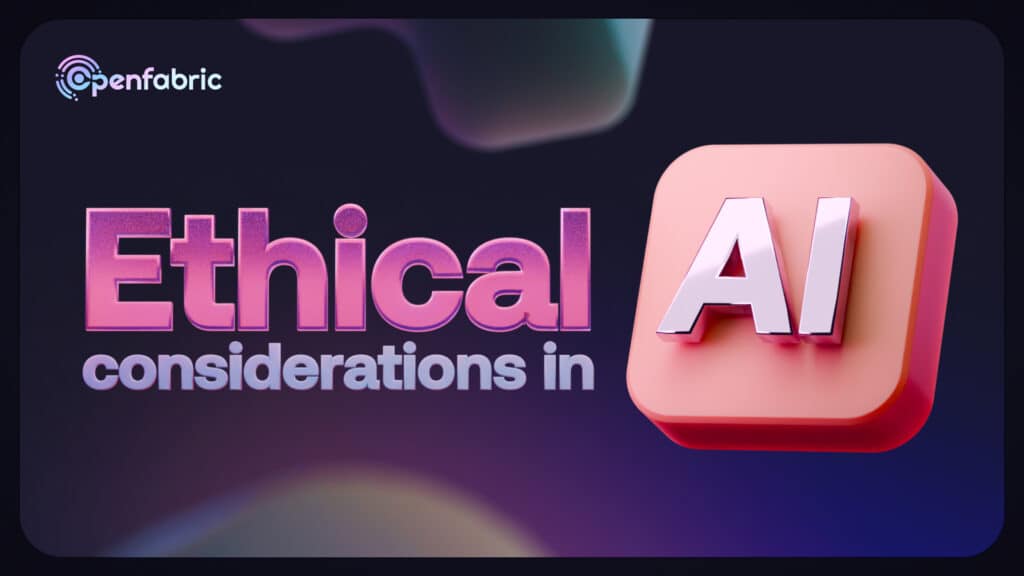
March 15, 2024 12 minutes read
Ethical Consideration In Artificial Intelligence

The world is moving fast in the direction of artificial intelligence. It is pertinent to note that there will be concerns as to how AI operates. This article is aimed at discussing the ethical consideration in AI and how they are handled. But first let us discuss Ethical AI.
Defining Ethical AI
Ethical AI encompasses a set of guidelines and principles that govern the design, implementation, and use of AI technologies. At its core, it seeks to ensure that AI systems operate in a manner that is fair, transparent, and accountable. This involves addressing issues such as bias, privacy, autonomy, and the potential societal impacts of AI applications.
Importance of AI
Artificial Intelligence (AI) has emerged as a transformative force across various sectors, revolutionizing the way we live, work, and interact. Its importance stems from its capacity to augment human capabilities, solve complex problems, and drive innovation. Here you can learn more about the importance of AI.
Importance of Ethical Considerations in AI Development
The advancement of AI technology brings excitement about its potential benefits but also raises ethical concerns. Neglecting these concerns risks worsening societal inequalities, perpetuating biases, and infringing on individual rights. Ethical considerations are essential for responsible innovation, guiding decisions from data collection to deployment.
Unethical AI practices undermine public trust and hinder adoption, diminishing effectiveness. Without ethical guidelines, AI risks being used for exploitation rather than empowerment. Transparent communication about ethical choices builds trust and accountability, while stakeholders must engage to address dilemmas and reduce harms.
Accountability mechanisms, such as regulatory bodies and industry standards, are vital for holding developers accountable. Integrating ethics into AI development is crucial for building trust, ensuring equity, and fostering sustainable progress. By prioritizing ethical principles, we can harness AI’s potential for societal benefit while minimizing risks.
The Ethical Considerations
As we continue to innovate in the field of AI, it is important to prioritize ethical considerations. This requires collaboration across disciplines, including computer science, ethics, law, and social sciences. By working together, we can develop AI systems that not only push the boundaries of technological possibility but also uphold the values and principles that define a just and equitable society.
In the following sections, we will explain specific ethical challenges in AI development and explore potential solutions to address them. Through thoughtful consideration and proactive action, we can harness the power of AI to create a better future for all. Here are the ethical consideration for artificial intelligence;
- Transparency and Accountability
- Fairness and Bias
- Privacy and Data Protection
- Safety and Security
- Human-Centered Design
- Ethical Decision Making in AI
- Social Impacts and Equity
- Accountability Mechanisms
- Summary of Key Ethical Considerations in AI
1. Transparency and Accountability in AI Systems
In artificial intelligence (AI), transparency and accountability stand as essential pillars ensuring ethical practice and societal trust. These principles advocate for openness in AI algorithms and decision-making processes, while also holding AI systems responsible for their outcomes. Transparency in AI algorithms is essential for fostering trust among users and stakeholders. When individuals interact with AI systems, they deserve to understand how decisions are made and what factors influence those decisions. Without transparency, users may feel alienated or distrustful of AI technologies, hindering their widespread adoption and acceptance.
By providing transparency in AI algorithms, developers can empower users to make informed decisions and curb potential biases or discriminatory outcomes. When users have access to information about how AI systems operate. From there, they can better understand and scrutinize the decisions made by these systems, ultimately promoting accountability and fairness.
Moreover, accountability instills a sense of responsibility among AI developers and organizations to prioritize ethical considerations throughout the design, development, and deployment phases of AI systems. By establishing clear lines of accountability, developers are impelled to proactively address potential risks and shortcomings, thereby enhancing the overall reliability and trustworthiness of AI technologies.
2. Fairness and Bias
Fairness and bias are critical considerations that demand careful attention. Identifying and mitigating bias within AI systems is paramount to ensuring equitable outcomes for all users.
The first step in addressing bias is to actively identify its presence within AI systems. This involves a comprehensive analysis of the data used to train these systems, as well as the algorithms themselves. By scrutinizing the data inputs and the decision-making processes of AI algorithms, developers can pinpoint instances where bias may manifest.
Mitigating Bias in AI Systems
Once bias is identified, proactive measures must be taken to mitigate its effects. This may involve reevaluating the training data to ensure it is representative of the diverse populations it will encounter in real-world applications. Additionally, developers can refine algorithms to prioritize fairness and equity, even at the expense of other performance metrics.
Furthermore, ensuring fairness in AI applications requires considering the impact on different demographic groups. AI systems must not disproportionately disadvantage certain populations based on factors such as race, gender, or socioeconomic status. By prioritizing fairness across diverse groups, AI developers can foster inclusivity and promote social equity.
3. Privacy and Data Protection: Safeguarding Personal Data
Privacy and data protection emerge as paramount concerns. As AI technologies become increasingly pervasive in our daily lives, the need to safeguard personal data within AI systems becomes more urgent. Respect for privacy rights in both the development and deployment phases of AI is essential to maintain trust and ensure ethical considerations are upheld.
Understanding the Importance of Privacy
Privacy is fundamental to individual autonomy and dignity. It encompasses the right to control one’s personal information and the ability to make informed decisions about its collection, use, and disclosure. In the context of AI, where vast amounts of data are processed and analyzed, protecting privacy becomes even more critical. Without proper safeguards, there is a risk of personal information being exploited or misused, leading to potential harms such as discrimination, surveillance, or loss of autonomy.
Implementing Privacy by Design Principles
Again, to address these concerns, AI developers must integrate privacy by design principles into their systems from the outset. This approach involves embedding privacy considerations into every stage of the AI development lifecycle, including data collection, processing, storage, and sharing. By proactively identifying and mitigating privacy risks, developers can minimize the likelihood of data breaches or privacy violations.
4. Ensuring Safe and Secure AI Systems: Addressing Potential Risks and Threats
Safety and security are paramount considerations in the development and deployment of artificial intelligence (AI) systems. As these systems become increasingly integrated into various aspects of society, it is essential to mitigate potential risks and threats they may pose.
Identifying Vulnerabilities
One of the first steps in ensuring the safety and security of AI systems is to identify potential vulnerabilities. This involves conducting thorough assessments of the technology, examining its functionalities, and scrutinizing its interactions with various environments and users. By pinpointing weaknesses early on, developers can take proactive measures to strengthen the system’s defenses against potential threats.
Implementing Robust Security Measures
However, once vulnerabilities are identified, the next step is to implement robust security measures to safeguard AI systems against potential risks. This may involve encrypting sensitive data, implementing access controls, and establishing protocols for handling security breaches. Additionally, ongoing monitoring and updates are essential to adapt to evolving threats and vulnerabilities.
Addressing Ethical Concerns
In addition to technical considerations, ethical concerns must also be addressed in the development and deployment of AI systems. This includes ensuring transparency, accountability, and fairness in algorithmic decision-making processes. By embedding ethical principles into the design and implementation of AI systems, developers can mitigate the potential for harm and ensure that these technologies align with societal values and norms.
5. Prioritizing Human Values and Well-being in AI Development
Human-centered design actively guides the development process, serving as a guiding light and focal point for ensuring that human needs and experiences remain central throughout. This approach places paramount importance on prioritizing human values and well-being, ensuring that AI systems align with ethical considerations.
Understanding Human Values
What’s more? Before going into the design process, it is noteworthy to understand the values that underpin human society. These values encompass principles such as fairness, transparency, privacy, and accountability. By recognizing and incorporating these values into AI development, we can foster trust and acceptance among users.
Enhancing Human Capabilities
In AI, the primary goal is to enhance human capabilities, not replace them. AI systems should help people do things better, like in healthcare, where they aid doctors in diagnosing diseases accurately, leading to better patient outcomes. Human-centered design focuses on creating AI that promotes human flourishing, considering both immediate needs and long-term impacts. By prioritizing well-being and sustainability in AI applications, we can prevent negative consequences and build a fairer, more inclusive future.
Incorporating User Feedback
Equally, in developing AI systems, active engagement with end-users and stakeholders is crucial. By gathering feedback and integrating user perspectives, designers ensure these systems meet their needs. This iterative process leads to continuous improvement, making solutions more effective. Human-centered design guides the development of ethical AI, prioritizing human values and enhancing capabilities. By promoting flourishing, we harness AI’s potential to positively impact society while minimizing risks. Ongoing collaboration and engagement are essential to this goal, working towards a future where AI enriches and empowers humanity.
6. Ethical Decision Making in AI: Ensuring Ethical Development and Deployment
Ethical decision making in the realm of Artificial Intelligence (AI) is imperative to foster trust, fairness, and accountability. By employing robust ethical frameworks and guidelines, developers can navigate the complexities of AI development, incorporating ethical considerations throughout the entire lifecycle of AI systems.
Establishing Ethical Frameworks: A Foundation for Responsible AI
Ethical AI development relies on established frameworks, guiding developers through ethical challenges. These frameworks integrate fairness, transparency, accountability, and privacy into AI design, reducing biases and unintended consequences. Adherence to specific guidelines is crucial, ensuring AI initiatives prioritize societal benefit and minimize harm.
In addition, transparent communication, interdisciplinary collaboration, and continuous evaluation are essential for addressing ethical concerns proactively. By engaging stakeholders in ethical discussions early on, risks can be identified and mitigation strategies established. Throughout the design process, monitoring and evaluation ensure AI systems align with ethical principles and societal norms.
Ethical decision-making drives responsible AI development and deployment. Robust frameworks and adherence to ethical guidelines cultivate trust and promote fairness. By incorporating ethical considerations from conceptualization to deployment, developers ensure AI systems serve the greater good.
7. Social Impacts and Equity: Assessing AI’s Societal Impacts and Promoting Equity
The social impacts and considerations of equity are paramount. It’s crucial to actively assess how AI technologies are affecting society and to promote equity and inclusion in their deployment and access.
Understanding Societal Impacts
When assessing AI technologies, it’s crucial to grasp their impact on society. AI can reshape healthcare, education, employment, and social interactions. Stakeholders must weigh these impacts to understand both positive and negative outcomes. On the positive side, AI can streamline processes, boost efficiency, and improve decision-making. For example, AI diagnostics in healthcare lead to quicker, more accurate diagnoses, potentially saving lives. Likewise, AI-driven personalized learning benefits education by catering to individual student needs. However, negative impacts include job displacement, widening inequalities, and concerns over data privacy and bias. Stakeholders must actively evaluate these risks to mitigate them and ensure equitable distribution of AI benefits.
Promoting Equity and Inclusion
To make AI fair and inclusive, we need to involve different people, including those who are often left out, in making it. By listening to many points of view, we can build AI that works well for everyone. We should also work on removing barriers like cost, having the right tools, and knowing how to use them. This could mean offering training so that everyone can use AI effectively. By looking at how AI affects society and making sure everyone can use it, we can make sure that AI helps everyone.
8. Future Directions and Challenges
As artificial intelligence (AI) continues to advance, it brings with it a host of emerging ethical challenges that demand attention. From issues surrounding bias and fairness to concerns about privacy and accountability, the development and deployment of AI technologies raise complex ethical considerations that require proactive strategies for anticipation and resolution.
Identifying Emerging Ethical Challenges
To understand AI ethics, we need to find and grasp the new challenges it brings. As AI gets more involved in our lives, it raises fresh ethical issues. For example, in self-driving cars, we need to decide how to keep people safe and think about the ethics of the computer’s decisions in life-or-death moments. To deal with these issues, we must be proactive. One way is to include ethical rules from the beginning of designing AI. By doing this, developers can think about the ethical impacts of AI early on, which helps to lower risks and make sure the tech follows ethical rules.
Furthermore, ongoing monitoring and evaluation are essential for identifying and addressing ethical issues that may arise throughout the lifecycle of AI systems. This includes implementing mechanisms for feedback and oversight to ensure that AI technologies are used responsibly and ethically.
Collaborative Efforts and Stakeholder Engagement
To handle the ethics of AI, everyone needs to work together—politicians, business leaders, scientists, and regular people. We can do this by talking openly and teaming up. Together, we can create rules and plans to make sure AI is used ethically.
Being clear and taking responsibility are very important for making people trust AI. We need to explain how AI works and how it makes decisions. This helps users see how AI affects things and makes sure developers are responsible for any ethical issues.
9. Key Ethical Considerations in AI
Data privacy matters in AI ethics. When personal data gets collected, stored, and used, it raises concerns about consent, transparency, and possible misuse. Without strong safeguards, privacy rights might get violated, which can make people trust AI systems less. It’s important to tackle bias in AI algorithms. Biased algorithms can worsen societal inequalities by showing and increasing biases already in the training data. To fight bias, we need to focus on collecting diverse datasets and thoroughly testing AI models to make sure they’re fair. Also, AI significantly affects employment. Automation powered by AI can replace human workers, leading to job loss and economic problems. Ethical thinking should prioritize plans for helping workers learn new skills to lessen the negative effects and make future workplaces more inclusive.
Conclusion
In light of these ethical considerations, stakeholders across academia, industry, and government must collaborate to promote responsible AI development and deployment. Transparency and accountability should be central tenets guiding the design, implementation, and regulation of AI systems.
Furthermore, interdisciplinary dialogue and engagement with diverse stakeholders are essential for identifying and addressing ethical challenges holistically. By fostering a culture of ethical reflection and continuous improvement, we can ensure that AI technologies align with societal values and contribute positively to human well-being.
So to round off this article, ethical considerations are not merely abstract concerns but fundamental imperatives for the ethical development and deployment of AI. As we navigate the complexities of AI ethics, a proactive and collaborative approach is essential to harnessing the potential of AI while safeguarding against its risks. Only through concerted efforts and collective commitment can we realize the promise of AI for the benefit of all.

